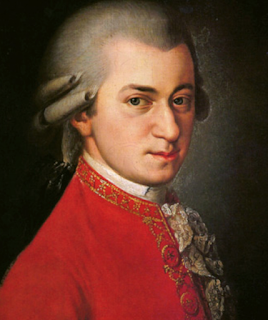THE CLASSICAL ERA
The Young Mozart
Besides training his young children (Mozart's sister Maria also composed and was extremely talented), Leopold Mozart definitely used his own influence to present the young musicians before royalty and influential patrons of the time. Mozart gained enormous fame as a child, which helped him throughout the rest of his life. (Maria discontinued studies once she reached marriageable age). Without a doubt, Mozart was absolutely brilliant and there has yet to be a composer who had such an impressive and prolific output at such a young age. Yet, his father's influence helped bring him into the spotlight. Even if Mozart's father had not been a "stage father", Mozart would probably have excelled in music because of natural talent and growing up in a musical family. However, he might not have gained fame so quickly.Mozart's sister (Maria Anna), called "Nannerl" by Mozart, was a very gifted musician. Both brother and sister were prodigies, pushed by their father Leapold (a respected musician). Leapold managed to have his children perform before kings, royalty, and rich patrons as children. Of course, as Maria Anna reached puberty, her musical career was discouraged to make way for her new career as wife. Fanny and Felix Mendelssohn was another duet of musical sibling prodigies (Fanny continued composing her entire life, but had difficulty receiving publication because of her gender).
In western music, the most pleasing (or consonant) sounds have simple ratios:
• Unison 1:1 (essentially two instruments playing the same note)
• Octave 1:2 (two instruments playing the same pitch, one playing that pitch at a higher level)
• Perfect Fifth 2:3 (almost always precedes a return to the unison/octave in classical works)
• Perfect Fourth 3:4 (Another common interval. In fact, many pop tunes start with the unison, then fourth, then fifth, but always back to the original note)
When you analyze Mozart's music, you see that he has absolutely perfected remaining within these ratios. Many musicologists and theorists have studied and researched the incredible correlation between Mozart's music and the golden mean.
Beethoven
Unlike Mozart who could quickly write and compose a symphony in no time at all (it was as natural as breathing to him), Beethoven worked exceedingly hard at creating his work. He was a perfectionist, his home covered in scratched out scores and manuscripts. Beethoven strove for ultimate perfection in his work. It is amazing that Beethoven, even after deafness had claimed his hearing forever, still produced incredibly symphonies and works, is quite a feat! There are many stories about Beethoven's dedication after losing his hearing. Beethoven lived a hard life. He cared for a nephew who had nervous breakdown and began suffering hearing loss (and eventually vision loss) at an early age. Stories abound about the composer placing his piano directly on the floor (he had the legs taken off) to hear the vibrations of the notes better, supposedly becoming blind after composing the Moonlight Sonata by the light of the moon, conducting orchestras like a madman because he could not hear the music, and even not being able to hear the applause after a work of his was completed. How much of this was truth, myth, or maybe tall tale is hard to surmise. In any case, Beethoven continued creating some of his best works well after his deafness was complete. Beethoven had many inspirations from his work, from nature, politics, and even death. The Eroica Symphony was originally meant to glorify the Age of Enlightenment, free thinking, free society, all in the embodiment of a new hero, Napoleon Bonaparte! Beethoven originally had intentions of naming the symphony after Napoleon as an homage to a great man. However, once Napoleon declared himself emperor, Beethoven changed the title to "Eroica" (or Hero) and dedicated it to the memory of a great man. We can only assume that the memory was to the man Napoleon was before egomania took over.
Beethoven had many inspirations from his work, from nature, politics, and even death. The Eroica Symphony was originally meant to glorify the Age of Enlightenment, free thinking, free society, all in the embodiment of a new hero, Napoleon Bonaparte! Beethoven originally had intentions of naming the symphony after Napoleon as an homage to a great man. However, once Napoleon declared himself emperor, Beethoven changed the title to "Eroica" (or Hero) and dedicated it to the memory of a great man. We can only assume that the memory was to the man Napoleon was before egomania took over. 













